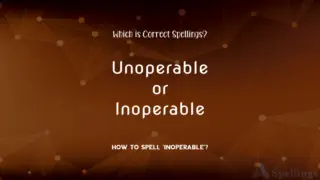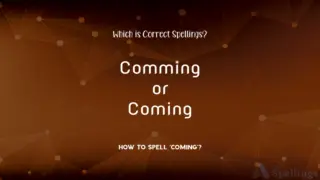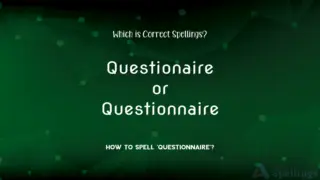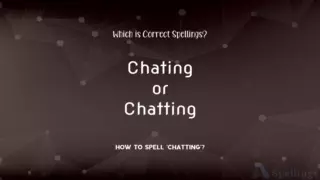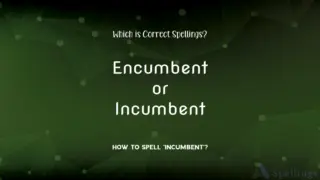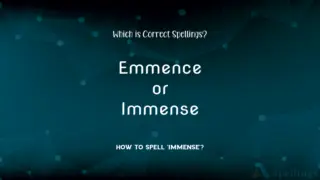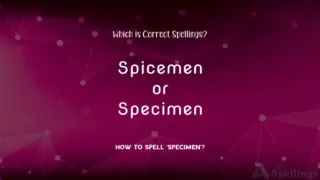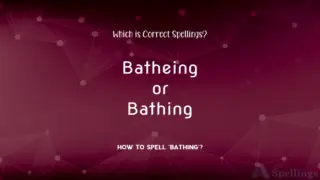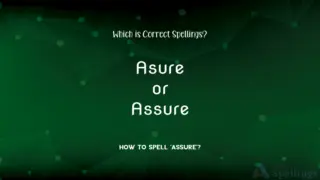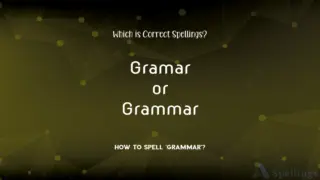Asside or Aside: Which is Correct Spellings?
Asside is the incorrect spelling of Aside, which means to or toward the side.
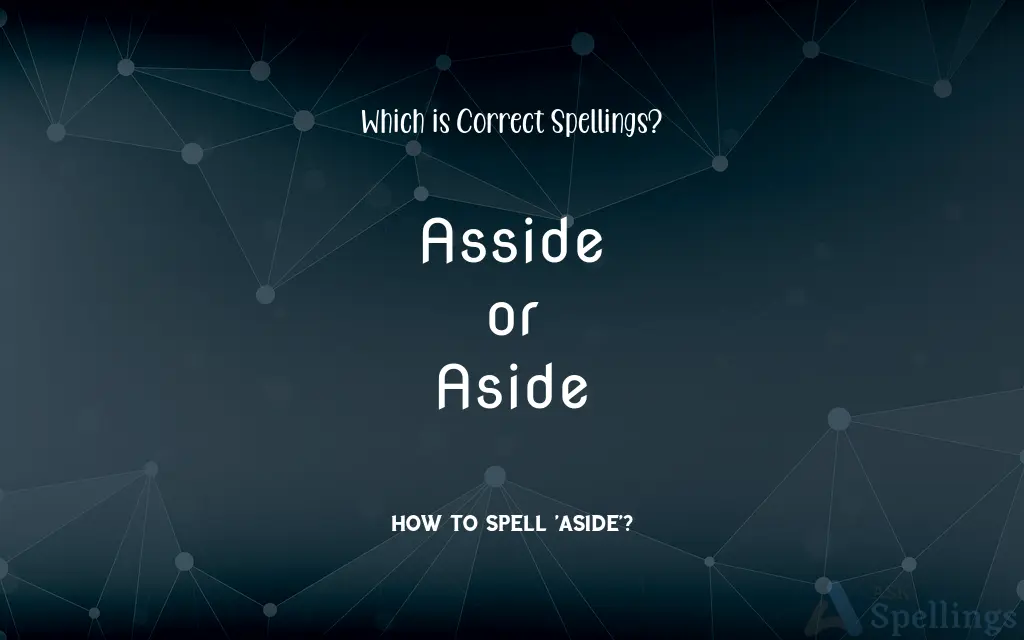
Which is correct: Asside or Aside
How to spell Aside?

Asside
Asside Spelling

Aside
Aside Spelling
Table of Contents
Is it Asside or Aside
The prefix "a-" in "Aside" suggests a direction or position, which is not indicated by "Asside."
Remember that "Aside" contains "side" as it refers to moving or stepping to the side.
"Aside" is similar to "beside," both involving direction or position, but without the extra "s" in "beside."
Think of "Aside" as setting something "aside" from the main group, without the extra "s."
How Do You Spell Aside Correctly?
Incorrect: He took me asside to talk in private.
Correct: He took me aside to talk in private.
Incorrect: Let's set those differences asside and work together.
Correct: Let's set those differences aside and work together.
Incorrect: She whispered something asside, thinking no one would hear.
Correct: She whispered something aside, thinking no one would hear.
Incorrect: Can you put that book asside for me?
Correct: Can you put that book aside for me?
Incorrect: The teacher asked to speak with him asside after class.
Correct: The teacher asked to speak with him aside after class.
Aside Definitions
In reserve; for future use.
She set aside some money for emergencies.
To or toward the side.
He stepped aside to let her pass.
Out of one's thoughts or mind.
Put your worries aside for now.
Apart from; except for.
Aside from the main issue, there are other problems.
Used to indicate a short comment by a character in a drama.
The actor's aside was humorous.
Aside Meaning in a Sentence
She moved aside to give the ambulance room.
Can we put our argument aside for the moment?
He took a book aside for further reading.
She whispered a joke aside to her friend.
Please step aside, I need to get through.
They set their work aside to help their friend.
The teacher pulled him aside to discuss his grades.
Let's put these feelings aside and focus on the task.
He brushed the obstacle aside effortlessly.
I need to set some time aside for studying.
Can you put that issue aside and look at this?
Moving aside, she allowed others to view the exhibit.
He kept his feelings aside to make an unbiased decision.
The child was told to move aside by the teacher.
They had to step aside to avoid the puddle.
Setting his fears aside, he climbed the mountain.
She set the novel aside when her friend arrived.
He jotted a thought aside in his notebook.
The coach took the player aside to give feedback.
Pushing his doubts aside, he proposed to her.
Put aside your work and come to dinner.
Can we set aside our differences and cooperate?
With a gentle nudge, she moved the kitten aside.
She cast her uncertainties aside and took the stage.
He saved a little money aside each month for vacations.
Aside Idioms & Phrases
Step aside
To move out of the way or to resign from a position.
He stepped aside to let the younger generation take over.
Turn aside
To divert or to change direction.
He turned aside to avoid the puddle.
Cast aside
To discard or reject something or someone.
The old system was cast aside in favor of a new one.
Toss aside
To discard carelessly.
He tossed aside his old shoes as if they meant nothing.
Joke aside
To temporarily stop joking and be serious.
Joke aside, this is a serious issue.
Brush aside
To dismiss or ignore something or someone.
His concerns were brushed aside during the meeting.
Set aside
To reserve something for a specific purpose.
She set aside time each day for meditation.
Push aside
To ignore or postpone dealing with something.
She pushed aside her fear and spoke up.
Aside from
Except for; apart from.
Aside from the rain, it was a perfect picnic.
Take aside
To speak to someone privately.
The manager took her aside to discuss her performance.
Lay aside
To put something aside temporarily.
Lay aside your books and come to dinner.
All joking aside
Used to indicate that one is being serious after a period of jesting.
All joking aside, we need to focus now.
Kick aside
To dismiss or get rid of something.
She kicked aside her doubts and went on the stage.
Move aside
To change position to allow someone to pass.
The crowd moved aside to let the procession pass.
Glance aside
To look quickly to the side.
She glanced aside when she heard her name.
Put something aside
To save or reserve something for later use.
He put some money aside for his vacation.
A word aside
A brief private conversation.
Can I have a word aside with you?
Throw aside
To discard or abandon.
He threw aside the broken toy.
Look aside
To look away to avoid eye contact.
He looked aside when the topic was mentioned.
Aside from that
Besides; apart from that.
Aside from that mistake, your work is excellent.
Common Curiosities
How do we divide Aside into syllables?
Aside is divided into syllables as A-side.
What is the verb form of Aside?
Aside does not have a verb form; it functions as an adverb or a preposition.
What is the root word of Aside?
The root word of "Aside" is "side," with the prefix "a-" meaning "on" or "to."
How many syllables are in Aside?
Aside has two syllables.
What is a stressed syllable in Aside?
The stressed syllable in Aside is the second syllable, -side.
How is Aside used in a sentence?
Aside is often used to indicate a movement to the side or a comment made by a character in drama to the audience.
What is another term for Aside?
Another term for Aside is "apart."
Why is it called Aside?
Aside refers to a movement, action, or comment moving towards the side, emphasizing a deviation from the main course or focus.
What part of speech is Aside?
Aside is used as an adverb or a preposition.
What is the singular form of Aside?
Aside does not have a singular or plural form; it is used unchanged in all contexts.
Is the word “Aside” a Direct object or an Indirect object?
Aside does not serve as a direct or indirect object because it is not a noun; it functions as an adverb or preposition.
What is the pronunciation of Aside?
Aside is pronounced as /əˈsaɪd/.
What is the plural form of Aside?
Aside does not have a plural form; it remains the same in all contexts.
Is Aside a noun or adjective?
Aside is neither a noun nor an adjective; it is primarily used as an adverb or a preposition.
Is Aside an adverb?
Yes, Aside can function as an adverb, indicating where something is moved or set.
Is Aside a vowel or consonant?
The term "Aside" itself is neither a vowel nor a consonant; it is a word that begins with a vowel letter.
Is Aside a collective noun?
No, Aside is not a collective noun; it's an adverb or a preposition.
Is the word Aside imperative?
No, Aside is not used in the imperative mood as it is not a verb.
Is Aside an abstract noun?
No, Aside is not a noun; it is used as an adverb or a preposition and therefore cannot be abstract.
Is Aside a countable noun?
No, Aside is not a noun and therefore cannot be countable or uncountable.
Which determiner is used with Aside?
Determiners are not typically used with Aside since it is not a noun.
Is Aside a negative or positive word?
Aside is neutral; it does not inherently carry a positive or negative connotation.
Which conjunction is used with Aside?
Conjunctions are not specifically paired with Aside, as it functions as an adverb or a preposition. It can be used with various conjunctions depending on the sentence structure.
What is the opposite of Aside?
The opposite of Aside could be "together" or "centered," depending on the context.
Is the Aside term a metaphor?
The use of "Aside" can be metaphorical, especially in literature, to indicate a departure from the main narrative or conversation.
Is the word Aside Gerund?
No, Aside is not a gerund because it is not a verb and does not have a verb form.
Which vowel is used before Aside?
The article "an" is used before Aside when it functions as a noun in certain expressions (though rare) because it starts with a vowel sound.
Which preposition is used with Aside?
As a preposition itself, Aside does not commonly require another preposition before it. However, it can be part of phrases like "aside from."
Which article is used with Aside?
When Aside is used in a phrase that acts like a noun, "an" is the appropriate article because of the initial vowel sound; however, this usage is not standard for its role as an adverb or preposition.
Share Your Discovery
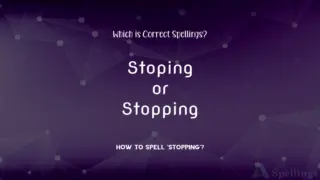
Previous Spelling
Stoping or Stopping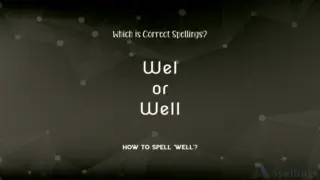
Next Spelling
Wel or Well
